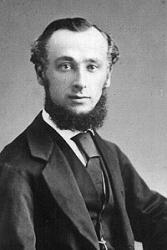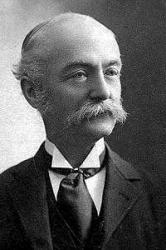Planning worship?
Check out our sister site, ZeteoSearch.org,
for 20+ additional resources related to your search.
- |
User Links
Person Results
John M. Wigner

1844 - 1911 Scripture: Matthew 11:28-30 Author of "Come to the Savior Now" in Trinity Hymnal (Rev. ed.) Wigner, John Murch, second son of J. T. Wigner, was born at Lynn, June 19, 1844. He was educated at the Grammar School of Lynn, and afterwards graduated B.A. and B.SC. in the London University. Mr. J. M. Wigner now resides near London, and has been for many years in the India Home Civil Service. He is connected with his father's church, and has done much to promote the spiritual welfare of the young. He is the author of several hymns, three of which are in the Baptist Psalms and Hymns for School and Home, 1882;—
1. "Come to the Saviour now!" Invitation.
2. "Lost one! wandering on in sadness." Return to God.
3. "Lo, a loving Friend is waiting." The Call of Jesus.
The first of these is in the Baptist Psalms & Hymns, 1880, and is dated 1871. [Rev. W.R. Stevenson, M.A.]
-- John Julian, Dictionary of Hymnology (1907)
John M. Wigner
Elizabeth Lee Smith
1817 - 1898 Person Name: Elizabeth Lee Smith (1817-1898) Scripture: Matthew 11:29-30 Translator of "I greet thee, who my sure Redeemer art" in Church Hymnary (4th ed.) Smith, Elizabeth Lee, née Allen, daughter of Dr. W. Allen, President of Dartmouth University, was born in 1817, and married in 1843 to Dr. H. B. Smith, who became Professor in Union Theological Seminary, New York, in 1850, and died in 1877. Mrs. Smith's hymns, including translations of "Je Te salue", “O Jesus Christus", are in Schaff's Christ in Song, 1869 and 1870. [Rev. F. M. Bird, M.A.]
--John Julian, Dictionary of Hymnology (1907)
According to the Canterbury Dictionary of Hymnology, Elizabeth Lee Smith passed away in 1898.
"Elizabeth Lee Smith." The Canterbury Dictionary of Hymnology. Canterbury Press. Web. 19 Apr. 2018. http://www.hymnology.co.uk/e/elizabeth-lee-smith.
Elizabeth Lee Smith
Juan Bautista Cabrera Ivars

1837 - 1916 Person Name: Juan B. Cabrera Scripture: Matthew 11:25-30 Translator of "A Jesucristo ven sin tardar" in Celebremos Su Gloria Juan Bautista Cabrera Ivars was born in Benisa, Spain, April 23, 1837. He attended seminary in Valencia, studying Hebrew and Greek, and was ordained as a priest. He fled to Gibraltar in 1863 due to religious persecution where he abandoned Catholicism. He worked as a teacher and as a translator. One of the works he translated was E.H. Brown's work on the thirty-nine articles of the Anglican Church, which was his introduction to Protestantism. He was a leader of a Spanish Reformed Church in Gibraltar. He continued as a leader in this church when he returned to Spain after the government of Isabel II fell, but continued to face legal difficulties. He then organized the Spanish Reformed Episcopal Church and was consecrated as bishop in 1894. He recognized the influence of music and literature on evangelism which led him to write and translate hymns.
Dianne Shapiro, from Real Academia de la Historia (https://dbe.rah.es/biografias/39825/juan-bautista-cabrera-ivars) and Himnos Cristanos (https://www.himnos-cristianos.com/biografia-juan-bautista-cabrera/) (accessed 7/30/2021)
Juan Bautista Cabrera Ivars
Nathaniel Norton

1839 - 1925 Person Name: Nathanael Norton Scripture: Matthew 11:28 Author of "Come Unto Me, Ye weary" in Church Hymns and Gospel Songs Nathaniel Norton USA 1839-1925. Born at Brooklyn,NY, he attended Yale University. He worked for the Metropolitan Life Insurance Company. He married Emma Sylvia Reed in 1865, and they had four children: Nathaniel, Caroline, Stella, and William. He died at Englewood, NJ, but was buried in Brooklyn, NY. No other information was found on this person.
John Perry
Nathaniel Norton
Pedro Grado
1862 - 1923 Scripture: Matthew 11:28 Translator of "¡Cuán tiernamente Jesús hoy nos llama!" in Himnario Bautista Pedro Grado Valdés studied law, but then wanted to become a pastor. He had a heart for helping the poor.
Dianne Shapiro from Celebremos su Gloria (Colombia/Illinois: Libros Alianza/Celebration), 1992
Pedro Grado
Ira David Sankey

1840 - 1908 Person Name: Ira D. Sankey Scripture: Matthew 11:28 Composer of "[Our life is like a stormy sea]" in Timeless Truths Sankey, Ira David, was born in Edinburgh, Pennsylvania, in 1840, of Methodist parents. About 1856 he removed with his parents to New Castle, Pennsylvania, where he became a member of the Methodist Episcopal Church. Four years afterwards he became the Superintendent of a large Sunday School in which he commenced his career of singing sacred songs and solos. Mr. Moody met with him and heard him sing at the International Convention of the Young Men's Christian Association, at Indianapolis, and through Mr. Moody's persuasion he joined him in his work at Chicago. After some two or three years' work in Chicago, they sailed for England on June 7, 1872, and held their first meeting at York a short time afterwards, only eight persons being present. Their subsequent work in Great Britain and America is well known.
Mr. Sankey's special duty was the singing of sacred songs and solos at religious gatherings, a practice which was in use in America for some time before he adopted it. His volume of Sacred Songs and Solos is a compilation from various sources, mainly American and mostly in use before. Although known as Sankey and Moody’s Songs, only one song, "Home at last, thy labour done" is by Mr. Sankey, and not one is by Mr. Moody. Mr. Sankey supplied several of the melodies. The English edition of the Sacred Songs & Solos has had an enormous sale; and the work as a whole is very popular for Home Mission services. The Songs have been translated into several languages.
--John Julian, Dictionary of Hymnology (1907)
Pseudonymns:
Harry S. Lower
Rian A. Dykes
====================
Sankey, I. D., p. 994, i. During the past fifteen years Mr. Sankey's Sacred Songs and Solos have had a very large sale, which has justified him in increasing the number of songs and hymns, including " New Hymns and Solos," to 1200. In 1906 he published My Life and Sacred Songs (London : Morgan & Scott). In addition to the "Story of his Own Life," the work contains an account of the most popular of his solos, with interesting reminiscences of the spiritual awakening of many who were influenced through his singing of them in public. In this respect it corresponds in some measure with G. J. Stevenson's Methodist Hymn Book, &c, 1883 (p. 1094, i.). It is an addition to the Sacred Songs and Solos, which will be held in esteem by many. In addition to his hymn, noted on p. 994, ii., Mr. Sankey gives details of the following:—
1. Out of the shadow-land into the sunshine. [Heaven Anticipated.] Mr. Sankey's account of this hymn is:—
"I wrote this hymn specially for the memorial service held for Mr. Moody in Carnegie Hall, where 1 also sang it as a solo. It is the last sacred song of which I wrote both the words and music. The idea was suggested by Mr. Moody's last words, 'Earth recedes; heaven opens before me . . . God is calling me, and I must go.' On account of its peculiar association with my fellow-labourer in the Gospel for so many years, the words are here given in full."
The hymn follows on p. 185, in 3 stanzas of 4 lines and a chorus.
2. Rejoice! Rejoice! our King is coming, [Advent.] Mr. Sankey writes concerning this hymn:—
"During one of my trips to Great Britain on the SS. City of Rome a storm raged on the sea. The wind was howling through the rigging, and waves like mountains of foam were breaking over the bow of the vessel. A great fear had fallen upon the passengers. When the storm was at its worst, we all thought we might soon go to the bottom of the sea. The conviction came to me that the Lord would be with us iu the trying hour, and sitting down in the reading room, I composed this hymn. Before reaching England the tune had formed itself in my mind, and on arriving in London I wrote it out, and had it published in Sacred Songs and Solos, where it is No. 524 in the edition. of 1888.
From Mr. Sankey's autobiographical sketch we gather that he was born at Edinburgh, in Western Pennsylvania, Aug. 28, 1840, joined Mr. Moody in 1871, and visited England for the first time in 1873. The original of the Sacred Songs, &c, of 23 pieces only, was offered as a gift to the London publishers of P. Phillips's Hallowed Song, and declined by them. It was subsequently accepted by Mr. K. O. Morgan, of Morgan & Scott, and is now a volume of 1200 hymns.
From a return kindly sent us by Messrs. Morgan & Scott, we find that the various issues of the Sacred Songs and Solos were:—
In 1873, 24 pp.; 1874, 72 pp. ; 1876, 153 hymns; 1877, 271 hymns; 1881, 441 hymns; 1888, 750 hymns; 1903, 1200 hymns.
In addition, The Christian Choir, which is generally associated with the Sacred Songs and Solos, was issued in 1884 with 75 hymns, and in 1896 with 281. The New Hymns & Solos, by the same firm, were published in 1888.
--John Julian, Dictionary of Hymnology, New Supplement (1907)
Ira David Sankey
Theophane Hytrek
1915 - 1992 Person Name: Sr. Theophone Hytrek, OSF, 1915-1992 Scripture: Matthew 11:28 Composer (acc.) of "[Say to the cities of Judah]" in Gather Comprehensive b. Feb. 28, 1915, Stuart, NE; composer; organist
Theophane Hytrek
Shirley Erena Murray
1931 - 2020 Person Name: Shirley Erena Murray (b. 1931) Scripture: Matthew 11:29-30 Author of "God weeps at love withheld" in Church Hymnary (4th ed.) Shirley Erena Murray (b. Invercargill, New Zealand, 1931) studied music as an undergraduate but received a master’s degree (with honors) in classics and French from Otago University. Her upbringing was Methodist, but she became a Presbyterian when she married the Reverend John Stewart Murray, who was a moderator of the Presbyterian Church of New Zealand. Shirley began her career as a teacher of languages, but she became more active in Amnesty International, and for eight years she served the Labor Party Research Unit of Parliament. Her involvement in these organizations has enriched her writing of hymns, which address human rights, women’s concerns, justice, peace, the integrity of creation, and the unity of the church. Many of her hymns have been performed in CCA and WCC assemblies. In recognition for her service as a writer of hymns, the New Zealand government honored her as a Member of the New Zealand Order of Merit on the Queen’s birthday on 3 June 2001. Through Hope Publishing House, Murray has published three collections of her hymns: In Every Corner Sing (eighty-four hymns, 1992), Everyday in Your Spirit (forty-one hymns, 1996), and Faith Makes the Song (fifty hymns, 2002). The New Zealand Hymnbook Trust, for which she worked for a long time, has also published many of her texts (cf. back cover, Faith Makes the Song). In 2009, Otaga University conferred on her an honorary doctorate in literature for her contribution to the art of hymn writing.
I-to Loh, Hymnal Companion to “Sound the Bamboo”: Asian Hymns in Their Cultural and Liturgical Context, p. 468, ©2011 GIA Publications, Inc., Chicago
Shirley Erena Murray
Marva J. Dawn
b. 1948 Person Name: Marva J. Dawn, 1948- Scripture: Matthew 11:28 Author of "Come Away from Rush and Hurry" in Worship and Rejoice
Marva J. Dawn
Michael Joncas
b. 1951 Person Name: Michael Joncas, b. 1951 Scripture: Matthew 11:28-30 Author of "Come to Me" in Gather Comprehensive
Michael Joncas


 My Starred Hymns
My Starred Hymns


